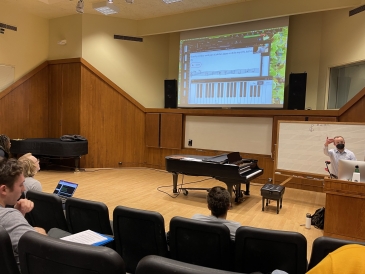
A Glimpse into a Sophomore's Spring Courses
Dartmouth's liberal arts curriculum appeals to me because I'm fully able to customize my own academic plan, dipping my toes into departments like Theater and Music while pursuing a double major in Economics and Environmental Studies with a minor in Public Policy. Usually students take three courses per term because Dartmouth runs on the quarter system, but I am taking my first four-course this spring. Since I'm really excited about each of my four classes, they don't feel like too much work this term, especially because I have been proactive with my assignments. Come learn about my schedule!
- No. 1
MUS 1: Beginning Music Theory
I start my Mondays, Wednesdays, and Fridays at 10:10 a.m. listening to jazz, pop, classical, and all sorts of genres in MUS 1, my first music class since grade school! Growing up, I played piano competitively for a while, but when I moved overseas in the sixth grade I slowly stopped playing as much to explore other activities. Professor Zsoldos, a professional saxophonist, grew up in a musical household and started figuring out melodies on the piano when he was four. He is all about inspiring a passion for music in his students, so we’ve been listening to pop songs like "You are the Reason" and more to discover what makes us want to dig into the material, using what we’ve learned to transpose the intangible forms of music into tangible sheet music. We’ve been developing our ear training abilities, distinguishing simple from compound meters, drilling our major and minor scales, and much more. I can feel my love of music coming back to life!
- No. 2
ENVS 55: Ecological Economics
After Music Theory, I head to my Ecological Economics class which starts at 11:30 a.m. on Mondays, Wednesdays, and Fridays. As an Economics and Environmental Studies double major, I absolutely love this class taught by Professor Howarth, who also instructed me in ENVS 3: Environment and Society. Professor Howarth is extremely knowledgeable about ecological economics! I took him out to lunch at Pine during my sophomore fall through Dartmouth’s Take a Faculty Member to Lunch program to learn more about what inspires him and what he does outside the classroom. During class, Professor Howarth lectures on topics like bioeconomic modeling, cost benefit analysis, fisheries management, working with Excel, nonmarket valuation, energy transitions, and environmental ethics, often bringing in our thoughts through informal class discussion. Our final assignment is to write a review essay on peer-reviewed literature on any topic of our choosing. I love this flexibility and am thinking of writing about how to incentivize energy conservation and behavioral changes through marketing, policy, and persuasion.
- No. 3
WGSS 59.04/THEA 21.01: Race, Gender, and Performance
I’ve never taken a course in the Women, Gender, & Sexuality Studies or Theater departments at Dartmouth, so this cross-listed 7-person class is my first look into studying theater and performance through an intersectional lens. We meet Mondays and Wednesdays from 3:30 to 5:20 p.m.. During the second week of the term, our class visited the Hood Museum to think about intersectionality through the arts, analyzing the paintings on the walls in the context of performance studies. Professor Edmonson is incredibly eager to help her students develop their arguments; she has made me feel confident in writing about the humanities as a social science major. During class, we sit in a circle formation and discuss assigned plays and critical essays, thinking about themes of intersectionality, disability, gender, stereotypes, and performativity. Since the class is so small, I really get to know my classmates and we have quite a range of scholars! A Physics and Theater double major and a Religion major are two examples of the diverse academic backgrounds we bring into conversation.
- No. 4
ANTH 50.48/GEOG 40.04: Energy Justice
Starting Winterim, I worked as a research assistant for Dartmouth’s newly established Energy Justice Clinic. Now, I’m enrolled in Energy Justice, a course housed between the Anthropology and Geography departments. This Social Impact Practicum meets on Tuesday and Thursday mornings for two hours and is held inside the new Irving Institute building, a great place to study appropriately situated at the crossroads of Tuck School of Business and Thayer School of Engineering. On Tuesdays we discuss the readings, watch videos, and hear a lecture, while on Thursdays we split up into our seven Clinic small groups: New Hampshire interviews and historical research, California interviews and historical research, energy audit, data research and visualization, policymaking, the Chilean case, and mini-grids. As part of the CA interviewing and historical research group, I look at community power in the state and figure out how to make solar programs more just for low-income communities. I’ve had the chance to interview stakeholders from Clean Power Alliance, my hometown’s community choice aggregation, as well as CalCCA, a larger organization that represents the interests of California’s community choice electricity providers and coordinates policy development among members on complex issues. We have also launched an Instagram page @energyjusticeclinic, which you can follow if you are interested in learning more about our work in the class as we explore how to make energy’s burdens and benefits more equitably distributed!





















